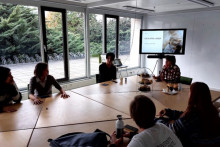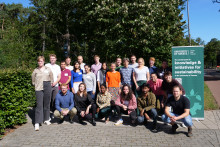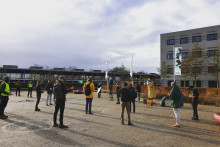Despite the somewhat meagre turnout, the participants present get off to an enthusiastic start. The workshop is attended mostly by students who are already part of University Rebellion or Green Hub Twente and are already somewhat frustrated by how hard it is to get things done.
Rolling the dice
After a round of introductions, the principle of the escalation ladder is explained. 'Start with small actions that address the problem at hand, and when this doesn't achieve anything, you go a step further and further.'
After this brief explanation, participants try out this principle for themselves during this so-called 'serious game'. For this game, they have to form a fictitious activism group with a certain goal. In this case, the students want UT to break all ties with fossil industry. To this end, they devise various actions to convince the UT to meet their demands. They then simulate the results of their actions by rolling a dice.
Taylor Swift
The actions start small, by sending an e-mail to the Executive Board. But after being ignored many times, the actions soon grow larger. Creative solutions also come along. 'We could ask Taylor Swift if she wants to support our action' suggests one of the students.
Another comes up with the idea of 'gaslighting' Shell, so that they would stop cooperating with UT - instead of the other way round. After several appearances on national television and several calls to the police, the dice ultimately do not fall in the participants' favour. The much-desired change fails to materialise.
In real life
The game gives an interesting insight into how campaigning works in real life; how small actions help gather supporters so that mass actions have more impact. It also shows that getting a lot of attention does not mean you get what you want, and how difficult it can be to achieve things. 'It felt worse to be ignored than when the police were called,' says one participant.
Despite the students not achieving their goals in the game, it does not mean they are going to stop campaigning in real life. After all, the game is never over, as long as you keep playing.






